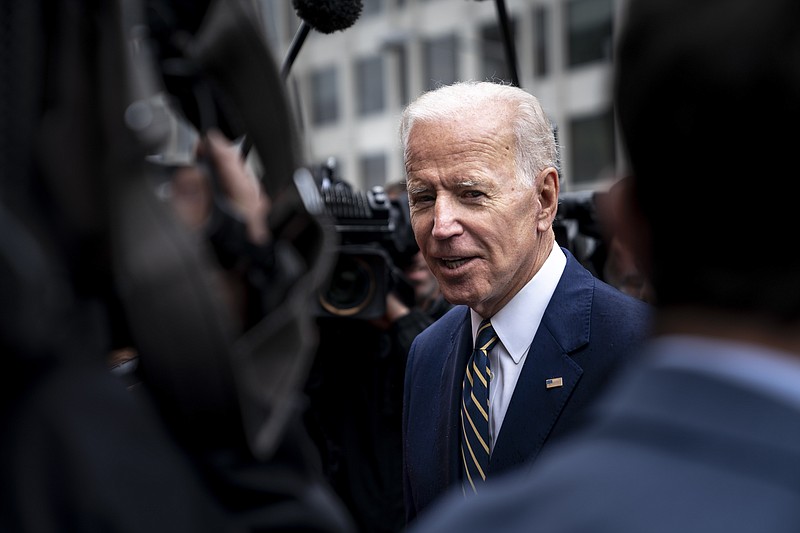OK, see how many Democratic presidential candidates you can name.
Five? That's pathetic. There are kids in grade school who can probably come up with eight. Kids in grade school in New Hampshire who have probably met eight.
Joe Biden's leap into the race makes, by The New York Times' count, 20 people officially in the running, with more still milling around the sidelines, sniffing the air.
No wonder Biden is leading in the polls. Potential campaign theme: "Vote for Joe - You Can Already Spell His Name."
Also new to the competition: Rep. Seth Moulton, 40, who celebrated his entry into the race by answering a question from a reporter about what he'd do in case of a space-alien invasion. Joining a cast that includes six senators, five other past or present members of the House and five people who are or have been mayors or governors. Plus two folks who have never been elected to anything and are safe to ignore unless one of them saves a drowning puppy.
Biden is, of course, a way bigger deal than any of the random members of Congress who are running on variations of the What Have I Got to Lose platform. He's got incredible name recognition, and everybody has stories about what a lovely guy he is in person.
On the other hand, he's been in national politics since 1972, and parts of his résumé will require a lot of explaining. Biden is going to be asked why he once helped weaken gun control, opposed busing for racial integration, supported the Iraq War and seemed to ignore complaints about sexual harassment by a Supreme Court nominee. Meanwhile, Beto O'Rourke is going to get questions about that computer hacking scandal when he was 15.
Then Biden, 76, is going to have to talk about age. We live in an era that celebrates 90-year-old park rangers, 85-year-old surfers and 105-year-old stockbrokers. But still, the idea of an 80-year-old first-term president has to give some pause. Defending the idea by pointing out that Ronald Reagan was in office until his late 70s will require discussing exactly how well that actually worked out. After which someone will suggest that Donald Trump has given all post-70 presidents a bad name.
On the other side of the age divide, we've got South Bend, Indiana, Mayor Pete Buttigieg, 37, talking about how it's time for millennials to be "stepping up." To think about this in a serious historical context, Buttigieg and Moulton were born while "M*A*S*H" was still on the air. Joe Biden was born before the debut of "Howdy Doody."
Buttigieg is younger than Beyoncé. Biden is younger than Ringo Starr. Although older than Mick Jagger.
(By the way, Moulton said that if an alien invaded the Earth he'd give him "a beer and a burger." This is a question we need to pursue in the candidate debates.)
We certainly aren't short on opportunities to get familiar with the Democratic pack. This week CNN broadcast town hall interviews with five major candidates on the very same night. You could have caught them all in less time than it takes to watch three episodes of "Game of Thrones" and a basketball playoff game.
If you missed it, I can tell you that Elizabeth Warren called climate change an "existential question" while Kamala Harris said it was an "existential threat." Someone asked Bernie Sanders whether he thought the Boston Marathon bomber should be allowed to vote. (Yes.) Warren gave a ripping explanation of her plan to put a "2-cent wealth tax in place on the 75,000 largest fortunes in this country" in order to pay for universal child care and her other priorities.
Buttigieg said it was important not to overwhelm people with too many specifics "before we've vindicated the values that animate our policies."
Perfectly fair to regard this as a cop-out from a guy who doesn't seem to have many actual positions. Or you can decide to follow his lead. When somebody asks you whether you think Warren is better than Harris, just say that you're not quite through analyzing the values that animate their policies. It'll definitely shut down the conversation.
However, if you complain a lot about the nefarious influence of big-money donors in our election system, this is an excellent time to pick somebody you like and send him or her a little cash. And it doesn't have to be too little. Sanders, who has gotten more than a million contributions, recently wrote a rather plaintive note to supporters pointing out that most of his new first-time donors were giving $3. Remember, Hillary Clinton's total campaign cost $1.4 billion. Bernie would need $4.28 from every man, woman and child in the country to come up with that.
(Sanders, by the way, is a year older than Biden but doesn't get a whole lot of comment about it. Maybe because he just seems to have been born 77.)
Everybody's looking for an angle to attract attention. This week Kirsten Gillibrand announced she just became the first 2020 candidate to offer a written pledge not to "seek, use or weaponize stolen or hacked materials in this presidential campaign."
Cory Booker just promised to pick a woman for a running mate. It's an interesting position but not nearly as interesting as a woman picking Cory Booker for a running mate.
The New York Times
